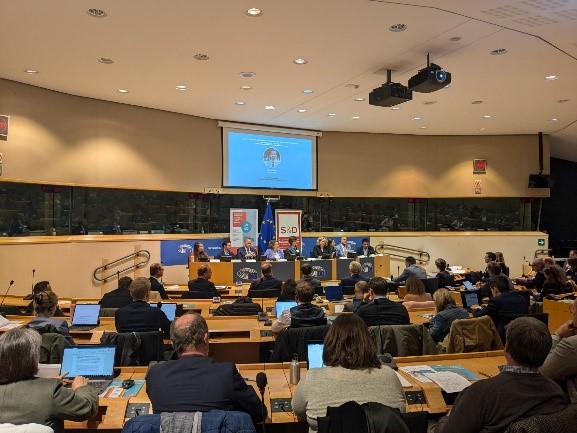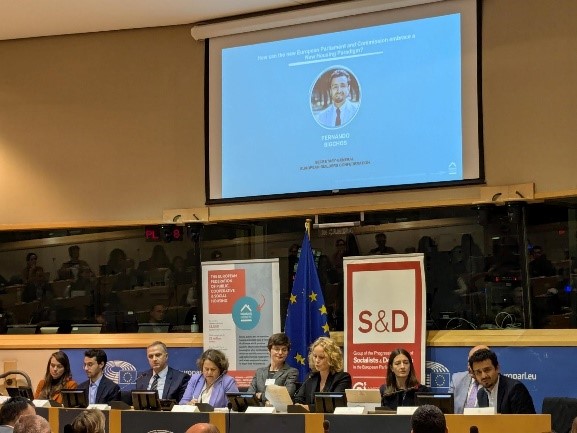
Housing: EBC in Housing Europe event on the role of the new European Parliament and Commission for affordable and sustainable housing
October 17, 2024
On 15 October, policymakers, housing experts, and industry leaders gathered at the European Parliament for an event hosted by Housing Europe, with the support of MEP Marcos Ros Sempere (Spain, S&D). Titled “What the New European Parliament and Commission Can Do to Lead the Way Out of the Housing Crisis”, the event discussed one of Europe’s most pressing challenges: providing affordable and sustainable housing for all. Among the key voices at the table was Fernando Sigchos Jiménez, EBC Secretary General, delivering a message on behalf of construction SMEs and crafts.
The event’s core focus: Resetting the housing paradigm
The event’s program began with a series of presentations, designed to frame the housing crisis in a post-election context. MEP Ros Sempere opened the discussion, setting the scene alongside Bent Madsen, President of Housing Europe. This was followed by an exploration of housing needs across Europe’s public, cooperative, and social housing sectors, with insights from Austria, Spain, France, the Netherlands and Germany.
Then, the session “How can the new European Parliament and Commission embrace a new housing paradigm?” started, moderated by Sorcha Edwards from Housing Europe. Next to Mr Sigchos Jiménez, it featured MEP Kim van Sparrentak (Germany, The Greens); Ruth Paserman from DG EMPL and Marek Teplansky from DG REGIO at the European Commission; Luciana Tomozei, from the European Investment Bank; Andres Jaadla, Rapporteur of the Committee of Regions opinion on smart, sustainable and affordable housing; FEANTSA; and the International Union of Tenants.
EBC’s core messages: Stability, Long-Term Financing, and Pragmatic Innovation
EBC’s intervention focused on the reality of the construction market, especially from the point of view of its majority of small construction companies. Our Secretary General addressed three main messages to an audience, reflecting the increasing nexus between the energy, housing and construction sectors.
- The need for a stable regulatory framework
On top of the high prices of materials and products, one of the central issues plaguing the construction industry is the inconsistency in regulatory frameworks across Europe. Mr Sigchos Jiménez argued that a stable, long-term regulatory environment is essential for builders, especially SMEs, to operate effectively. Frequent changes in building codes, environmental regulations, and safety requirements create uncertainty and increase costs, making it difficult for construction firms to plan and execute projects on time and withing budget.
EBC believes that the European Commission and Member states should ensure a clear and predictable legislative framework that supports more sustainable construction practices. By providing regulatory certainty, builders would more confidently invest in new housing projects, knowing that the rules of the game will not change mid-project.
- Long-term financial support for renovation and new builds
Renovating Europe’s aging housing stock, particularly to improve energy efficiency, is a cornerstone of addressing both the housing crisis and climate goals. However, such renovations require long-term financial support, which is currently lacking. Implementing financial schemes that extend well beyond short-term stimulus packages should be a key objective, reflecting notably the 2050 outlook to decarbonise the EU building stock or the recast Energy Performance of Buildings Directive.
Low-interest, long-term financing options, provided through mechanisms like InvestEU and the European Investment Bank (EIB), would make renovations more economically feasible. Renovation projects, especially those focusing on energy efficiency, have longer payback periods, and craftsmen and SMEs need stable and accessible financing to make these initiatives successful. In that sense, he suggested to the European Commission to provide an exhaustive mapping of the EU funds and financial programs that are available for housing investments at national and regional level, so as to clarify the routes to access them for both public and private entities.
- Industrialisation: opportunities and realities in construction
There seems to be a growing discussion around the industrialisation of the construction sector as a pathway to deliver affordable housing at scale. Prefabrication, modular construction, and automation could offer potential cost and time savings indeed, if thought in a human-centric way. However, EBC Secretary General emphasised that industrialisation is not a silver bullet for every housing project, considering the particularities of the EU building stock. Local market realities mean that industrialised solutions must be tailored to specific contexts, often opting for building-specific solutions.
One should take into account that the overwhelming majority of small construction and renovation companies are anchored and operate at the regional and local levels. Moreover, the upfront costs of adopting industrialised methods can be prohibitive for many micro companies. In that sense, the European Commission was invited to offer further technical and financial support to smaller construction companies to help them adopt new methods, while also recognizing that traditional construction techniques will continue to play an important role, particularly in regions with specific local needs.
While industrialisation has been often discussed as a quick fix to housing affordability, the market’s complex realities, ranging from high material costs to workforce shortages, require solutions that are both innovative and grounded in the current economic landscape.
The Road Ahead for Europe’s Housing Crisis
As the event drew to a close, the messages shared by the EBC served as a reminder of the construction sector’s critical role in solving Europe’s housing crisis. But builders cannot do it alone. They need stable regulations, long-term financial support for energy renovation, and a realistic approach to industrialisation, on top of support to tackle structural challenges such as labour and skills shortages.
EBC stands ready to collaborate with the new European Parliament and Commission and relevant stakeholders to bring the needs and solutions of the sector, in order to support policies that are targeted, pragmatic, and forward-looking.
  @EBC | For more information about the Housing Europe event “How can the new European Parliament and Commission embrace a new housing paradigm?”, click here To consult the Open letter of the Construction 2050 Alliance on the housing crisis from April 2024, click here. |
No related priorities found.